Our gut microbes love a good workout
Exercise keeps our gut buddies happy, which may explain some of its benefits to body and brain

Exercise, especially through adolescence, may benefit our bodies and brains for the rest of our lives. Researchers think the bugs in our gut help explain why.
omgimages/iStock/Getty Images Plus
Exercise does more than make us hot and thirsty. It can have big effects on the trillions of microbes that live in our gut. Each one-celled organism is tiny. Together, their huge community, known as the gut microbiome (My-kroh-BY-oam), can weigh up to 2 kilograms (4.4 pounds). Its microbes can offer mighty benefits. They help digest food to extract the energy our bodies need. They help fight infections. They may even affect our mood. Technology can now gauge the activity of these microbes — and how it changes with exercise.
Lucy Mailing is a nutritional scientist. She earned her PhD at the University of Illinois Urbana-Champaign. There, she was part of a team that studied how exercise affects the gut microbiome.
The researchers recruited 32 men and women who were fairly inactive. For six weeks, each recruit exercised three days a week. They worked out on a treadmill or bike, starting at 30 minutes per day. Over the weeks, they gradually increased the workouts to 60 minutes.
The researchers wanted to see how becoming active might affect someone’s gut microbes. And to find out, they didn’t have to open anyone up. They just had to wait for a share of the microbes to come out — in poop. Each recruit collected some of their feces before the study began. They did it again right after the six weeks of exercise ended. Six weeks after that, they collected one last sample of poop.
During the workout weeks, the recruits did not change what they ate — except for three days before each poop collection. For those days only, each of the recruits followed a menu designed just for them. It included only foods and drinks from their usual diet.
Collecting poop is yucky. Receiving and processing it is, too. But working through this yuckiness yielded new insights. For instance, the recruits’ microbes made more short-chain fatty acids (SCFAs) that are good for health. One of these was butyrate [BYOO-tur-ayt]. Studies have shown it can protect against certain cancers, fight inflammation and regulate genes that promote health. It may even enhance sleep. Our gut bacteria make such SCFAs from the fiber found in nuts, grains and many vegetables.

By the end of the study, the recruits had more SCFA-producing microbes than at the start. This was especially true in lean people. And those with more of these bacteria lost more body fat during the six weeks of exercise. Their fitness also improved more quickly.
But once people stopped exercising, their gut microbiomes went back to what they had been before the study. This shows that “regular exercise changed the composition and activity of the gut microbes,” Mailing says. And the benefits of exercise in these people had likely been helped along by those microbes, she adds.
Her team shared its findings in the April 2018 Medicine & Science in Sports & Exercise.
Making sense of the findings
Riley Hughes studies nutritional biology at the University of California, Davis. Her work focuses on how dietary fiber affects gut microbes and their human hosts. She summarized research on exercise, diet and the microbiome in the January 2020 Frontiers in Nutrition.
“Multiple studies have found that exercise increases butyrate and other beneficial SCFAs,” says Hughes. Some of those studies involved mice. Others worked with human volunteers, as Mailing’s team had.
Athletes have more SCFAs in their gut than non-athletes, Hughes notes. Active people also host a greater variety of gut microbes. But in human studies, the participants seldom eat the same foods. It’s hard to know, then, if changes in the microbes were due to what people ate, how they exercised or both.
Hughes says two things would help get around this uncertainty: Keep constant the variety of plant foods and the amount of fiber the recruits eat. “Both,” she points out, “have large beneficial effects on our gut microbiome.”
In the Illinois exercise study, Mailing didn’t measure the mood of the participants. But our tiny gut buddies may also help explain why exercise boosts mental health. “Animal studies have shown that butyrate has positive effects on the brain,” notes Mailing. Many other links also exist between our gut and brain. In 2016, for example, researchers injected poop from people with depressive symptoms into healthy mice. Soon these mice showed signs of depression.
Studies of how our gut and brain communicate are relatively new. But scientists have already discovered that childhood and adolescence are unique windows for recruiting these microbes. Regular exercise and a good diet during these early life stages create a healthy microbiome. It then goes on to benefit our bodies and minds for the rest of our lives, researchers at the University of Colorado at Boulder note. Agnieszka Mika and Monika Fleshner summarized the studies behind that conclusion in the January 2016 Immunology and Cell Biology.
Scientists will surely squeeze ever more information out of poop. But the take-home message of those data will probably stay the same: Exercise is good for you.







